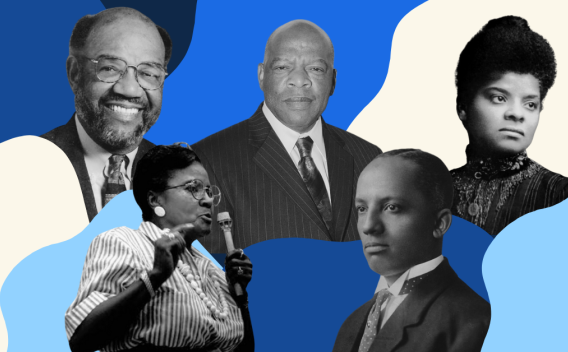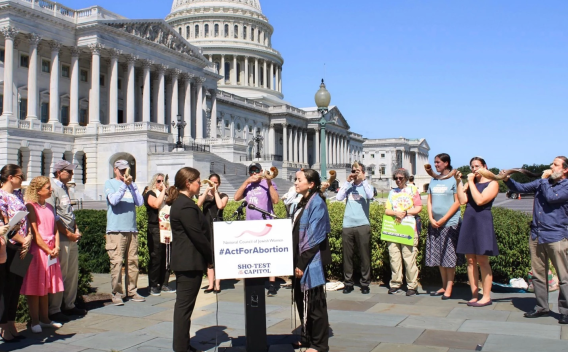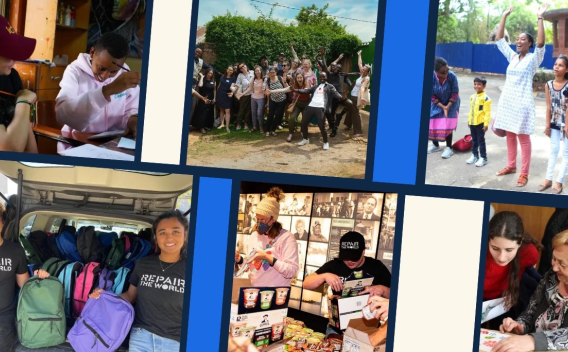By
Published
August 27, 2021
Tags
We are pleased to share this reflection from Tiffany Harris, Chief Program Officer of Moishe House, a REALITY alum and an ROI Community member, as part of a series spotlighting leaders building more equitable and inclusive Jewish communities. Read additional reflections from Yoshi Silverstein, Founder and Executive Director of Mitsui Collective and Dalia Fleming, Executive Director of KeshetUK.

Tiffany Harris (Photo: Bryson Strupp)
Last summer—amid a racial reckoning nationwide—I was excited to see a burst of enthusiasm across workplaces to advance diversity, equity and inclusion (DEI). This energy came as a welcome relief following years of criticism toward racial justice movements and calls to build more equitable workplaces and communal spaces.
Yet, as corporate statements on racial equity flashed across social media platforms, I was cautiously optimistic about the potential for real change. Time and time again, I have seen rushed inclusion lead to exclusion, so I am concerned when organizations and individuals act in haste to appear anti-racist without doing the real work to build inclusive spaces.
For many of us, there is something daunting and deeply unsatisfying about viewing change as a long game. But viewing DEI work as “low-hanging fruit” or “quick wins” implies that DEI efforts are simply items on a checklist, not part of a serious approach to correct legacies of inequity. That is why, in my role as Chief Program Officer at Moishe House, I am prioritizing DEI education and breaking down long-term DEI goals into timely, digestible and definable tactics. In doing so, I believe we can maintain momentum for DEI work in the short-term while moving toward sustainable long-term change.
Committing to DEI at Moishe House
I joined the team at Moishe House as Chief Program Officer last summer to support Moishe House’s mission to help young adults around the world create meaningful, welcoming Jewish communities for themselves and their peers. One of the reasons I wanted to join Moishe House was the organization’s belief that committing to DEI is not just a business imperative, but also a moral imperative directly aligned with the institution’s values of pluralism, diversity and individuality
As part of this commitment, our Board of Directors, staff, and constituents from our network of global community builders recently completed sixteen hours of training and skill development with Dr. Dietra Hawkins, a specialist in addressing approaches toward systemic change, developing asset-based communities and supporting healing from racism. Our hope for these sessions was to identify the scale, scope, vision and goals for our DEI work at Moishe House to help our team develop a foundation for enduring cultural change.
To begin this work, Dr. Hawkins helped our team identify why we should commit to this work. Some questions we asked ourselves included:
- Why are we doing this work?
- What is the historical context?
- Why is it important?
Next, we worked through the question of how we should address DEI. This question was critical in helping us think through tangible steps to embed DEI fully across our organization. Some questions we asked ourselves included:
- How do we begin to address any inequities in our organization?
- Where do we start?
Planning and Implementing DEI Strategy
During these sessions, I asked my team to share insight into their lived experiences, and we asked the same of our community builders. We considered our organizational mission and the unique capacities within our organization to drive positive change. This approach gave visibility into the work and allowed our team members to take ownership over creating a list of areas for change at Moishe House, which will guide our DEI strategy in the years ahead. This list includes:
- A set of DEI Guiding Principles to guide all facets of our work
- An approach for tracking our DEI performance alongside our strategic planning
- The formation of DEI committees for our staff and Board, as well as opportunities for continued learning
- A revised approval process for Jewish educators working with Moishe House
- Updated language, images and policies for our recruitment, guidebooks and onboarding materials
- A plan to open new hub offices outside our original hub cities, allowing us to hire diverse talent across more geographic locations
- A plan for creating employee resource groups to help staff members find inclusion support in real-time

A Jews of Color Moishe Pod celebrating the 2020 Lunar New Year.
We are just beginning to scratch the surface with these plans, and our DEI efforts are ongoing—with progress sometimes difficult to assess. That said, I already see a notable shift in our organizational culture, with DEI increasingly treated as integral to our mission as a Jewish nonprofit providing vibrant Jewish experiences for young adults.
For example, our Director of Jewish Education was previously the sole approver for Jewish educators working on Moishe House retreats. After our trainings with Dr. Hawkins, our team decided to revise this process by selecting a diverse interview panel for prospective educators, allowing us to leverage different points of view and decrease unconscious bias. Today, our list of available educators looks and feels very different than it did four months ago and includes more women, people of color and people of varied Jewish observance.
With DEI efforts at the center, I know we can build a stronger and more inclusive organization that welcomes differences and creates a sense of belonging for our staff and constituents. In turn, we will further our mission and benefit the Jewish communities we serve.
Building Momentum for Long-term Change
As I have experienced in this work at Moishe House, every organization’s DEI strategy should hold its own logistical complexities and internal dynamics. To create lasting change, planning and implementing a DEI strategy organization-wide requires significant ongoing evaluation, development and support.
But that effort pays off; when organizations plan and implement their own DEI strategy, they transform their own culture while contributing to a collective effort to create more equitable and inclusive Jewish communities across the globe. For us to achieve change at the systems level, we must first do the work with our organizations, with our teams and with ourselves.
As we approach a new year for our Jewish communities, I encourage you to reflect on your own organization’s unique capacity to drive DEI work forward. You can start by identifying:
- What DEI means to your team
- Your vision for embedding DEI in your internal culture
- The impact you want to have on the Jewish communities you serve
- The individual tactics that can help you reach your goals
- What training offerings would best benefit your team and community
I am confident that this new year will bring new opportunities for us to listen, learn and identify promising areas to create long lasting impact. By allowing space for time, attention and experimentation, I know each of us can serve as remarkable engines of change on our teams, at our organizations and for Jewish communities across the globe.
Charles and Lynn Schusterman Family Philanthropies welcomes the expression of personal thoughts and reflections on our blog. Each post reflects the opinion of its author and does not necessarily represent the views of our organization or our partners.






